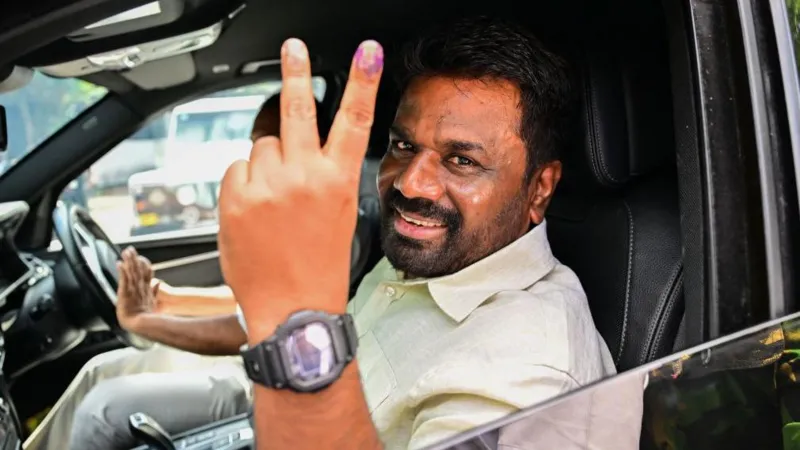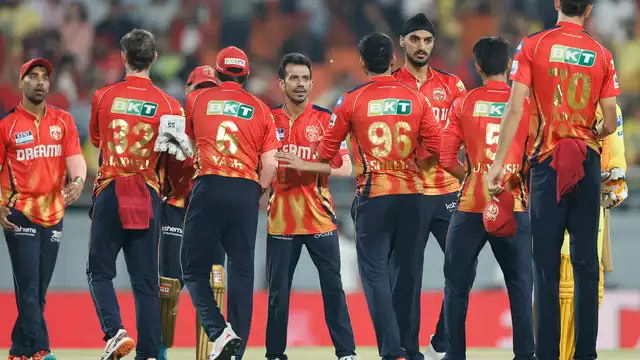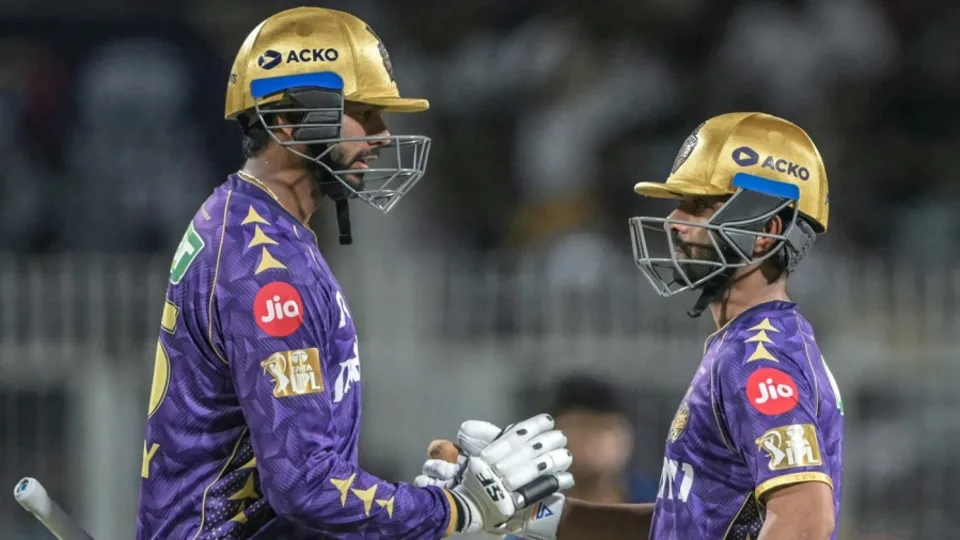Latest News
National People’s Power (NPP) win two-thirds majority in parliament, with 159 seats

President Anura Kumara Dissanayake’s National People’s Power (NPP) coaliton scored a two-thirds majority in parliament by winning 159 seats at Thursdays [14] parliamentary election.
Dissanayake, who was elected in September, needed a clear majority to deliver his promise to combat corruption and restore stability after the island’s worst-ever economic crisis.
The high cost of living was one of the key issues for many voters.
Analysts had expected the NPP to do well in the elections but what remained to be determined was the margin of victory, and whether it would get the two-thirds majority it wanted to be able to pass its ambitious reforms.
In the outgoing assembly, Dissanayake’s Janatha Vimukthi Peramuna (JVP) party, which now leads the NPP, had just three seats.
The 55-year-old earlier told reporters that he believed this was “a crucial election that will mark a turning point in Sri Lanka”.
Sajith Premadasa, the man Dissanayake defeated in the presidential elections, led the opposition alliance.
Dissanayake called for snap elections shortly after he became president to seek a fresh mandate to pursue his policies. There was “no point continuing with a parliament that is not in line with what the people want”, he had said.
Nearly two-thirds of former MPs had chosen not to run for re-election, including prominent members of the former ruling Rajapaksa dynasty.
Out of the 225 seats in the parliament, 196 MPs were directly elected. The rest were nominated by parties based on the percentage of votes they get in what is known as proportional representation.
High inflation, food and fuel shortages precipitated a political crisis in 2022 which led to the ousting of President Gotabaya Rajapaksa. His successor Ranil Wickremesinghe managed to negotiate a bailout package worth $3bn with the International Monetary Fund – but many Sri Lankans continue to feel economic hardship.
“We are still stuck with the problems we faced before. We still don’t have financial help even to fulfill our daily needs,” 26-year-old garment factory worker Manjula Devi, who works in the Katunayake Free Trade Zone near Colombo, told the BBC.
The number of people living below the poverty line in Sri Lanka has risen to 25.9% in the past four years. The World Bank expects the economy to grow by only 2.2% in 2024.
Disenchantment with established political players greatly helped the left-leaning Dissanayake during September’s election. His party has traditionally backed strong state intervention and lower taxes, and campaigned for leftist economic policies.
Dissanayake made history as Sri Lanka’s first president to be elected with less than 50% of the vote. Many observers think his alliance will do better this time.
How his alliance fares will be partly due to a fragmented opposition – with many leaders and parties breaking away into either smaller groups, or contesting as independent candidates.
Observers say the JVP-led alliance ran a more vibrant campaign than the opposition.
The coalition will now be under massive pressure to perform and live up to their campaign promises. Dissanayake has promised to repay the country’s debt, reform its political culture, and punish members of past administrations for corruption.
Sri Lanka’s economic situation remains precarious – and the main focus is still on providing essential goods and services. How the country progresses from this point will be a real challenge for the new government.
[BBC]
Latest News
IPL 2025: Sensational Priyansh Arya condemns Chennai Super Kings to another loss

A sensational maiden IPL ton from Priyansh Arya condemned Chennai Super Kings to their fourth successive loss in IPL 2025. Under severe pressure in run chases, CSK finally managed to breach the 200-run mark but it still wasn’t good enough as Arya’s stunning 39-ball ton in just his fourth appearance, coupled with another sloppy fielding display let the visitors down.
Where was the game won?
Quite strangely, it was the PowerPlay once again even though CSK had a fruitful opening stand. They didn’t lose a wicket as well in the PowerPlay but it still proved to be the point of difference as Punjab Kings went berserk in their first six overs. Despite losing three wickets, Priyansh Arya made all the noise in this phase as he raced to a stunning half-century to power his team to 75 for 3.
Punjab Kings
Powerplay – A flying start for the hosts
Phase score – 75/3 [RR: 12.50, 4s/6s: 5/6]
Only for the fourth time in the history of IPL, a game began with a six as Priyansh Arya upper cut Khaleel Ahmed off the very first ball over the ropes. That was a sign of things to come as the PowerPlay turned out to be very eventful. There were wickets, there were runs and in the end it was the home side that finished the phase on top despite having three batters back in the pavilion already. Prabhsimran Singh inside-edged one onto his stumps and then Shreyas Iyer and Marcus Stoinis were sent packing by Khaleel Ahmed. But at the other end, Arya went absolutely berserk taking on every single bowler. Veteran R Ashwin was welcomed with a four and got picked apart for 21 runs as Arya brought up a stunning 19-ball fifty.
Middle overs – The Priyansh Arya show
Phase score – 89/3 [RR: 9.88, 4s/6s: 4/7]
Despite that poor start, Ashwin came back with a bang as he picked two crucial wickets in a single over to turn the tide. Nehal Wadhera skied one and was caught by Dhoni and in the same over, Glenn Maxwell hit one hard straight back to the bowler to fall for 1. At that point, PBKS’s chances appeared bleak with half the side back in the pavilion for just 83. However, after a couple of overs they were at it again. They continued to adopt a positive approach and it paid off as Arya and Shashank Singh went on a six-hitting spree. Ashwin’s final over saw him concede 20 runs, and Matheesha Pathirana was then carted around for a hat-trick of sixes as Arya brought up a sensational century. PBKS managed to score 43 runs off 12 balls in that period which once again put them on the box seat. Arya, who had a slice of luck enroute his century, was finally dismissed when he hit Noor Ahmad straight to long on.
Death overs – Shashank, Jansen blunt CSK
Phase score – 55/0 [RR: 11, 4s/6s: 2/3]
Despite Arya’s heroics, CSK could have still kept Punjab Kings below 200 considering they were a wicket away from bowling at the tail. However, Shashank and Marco Jansen kept the away side at bay at the death. Ruturaj Gaikwad’s decision to not bowl Noor for his fourth over proved to be costly as well. With Pathirana also having an off-day, CSK ended up conceding a few boundaries at the death with Shashank getting to his fifty.
Chennai Super Kings
Powerplay – Finally, a productive opening stand
Phase score – 59/0 [RR: 9.83, 4s/6s: 10/0]
Devon Conway and Rachin Ravindra put an end to CSK’s opening woes this season with a fruitful partnership in the PowerPlay. They kickstarted the run chase with a boundary each in the first over and repeated the feat in Arshdeep Singh’s next over as well. Rachin then took on Yash Thakur for a hat-trick of boundaries to give CSK some momentum. In the process, the duo put on more than 50 for the opening wicket to lay down the foundation.
Middle overs – Under-fire duo keep CSK’s faint hopes alive
Phase score – 86/2 [RR: 9.55, 4s/6s: 5/4]
Just when CSK thought they could capitalise on that start, things turned sour real quick as Rachin got stumped off Maxwell in the very first over after the PowerPlay. To make matters worse, Gaikwad failed to contribute once again in a big chase and that put CSK under a lot of pressure. Already under fire for not delivering in the tournament, Shivam Dube had a massive job in hand alongside Conway. Dube made a good start to his innings and he got himself going with a flat six off Lockie Ferguson. Conway, who received a couple of reprieves, hit a much-needed six off Stoinis to release some pressure before a big over from Jansen dragged CSK back into the contest heading into the slog overs.
Death overs – CSK fall short……again!!
Phase score – 56/3 [RR: 11.2, 4s/6s: 1/4]
PBKS needed just two good overs to turn the tide completely in their favour. And they got it from their experienced duo of Arshdeep and Ferguson. Following a tight over from the left-arm pacer, Ferguson bowled a very good knuckle ball to castle Dube as the equation came down to a very tough 68 off 24. Yuzvendra Chahal was finally brought into the attack for his first over and he too delivered to drag his team closer to the win. MS Dhoni then kept CSK’s faint hopes alive with a couple of sixes off Ferguson before smashing Arshdeep for a four and a six, as the equation came down to 28 off 6. Yash Thakur, tasked with bowling the final over, got the big wicket of Dhoni with a full toss down leg that the veteran hit straight to short fine-leg. CSK needed someone to pull off a Rinku Singh at that point, which just didn’t happen.
Brief scores:
Punjab Kings 219/6 in 20 overs (Priyansh Arya 103, Shashank Singh 52*, Marco Jansen 34*; Khaleel Ahmed 2/45, Mukesh Choudhary 1-21, Ravichandran Ashwin 2-48, Noor Ahmad 1-32) beat Chennai Super Kings 201/5 in 20 overs (Devon Conway 69, Shivam Dube 42, Rachin Ravindra 36, MS Dhoni 27; Yash Thakur 1-39, Glenn Maxwell 1-11, Lockie Ferguson 2/40) by 18 runs
What’s next for the two teams?
With pressure mounting, CSK are now in need of a quick turnaround as they return home to face Kolkata Knight Riders on Friday. A day later, Punjab Kings will take on another team that’s under pressure – Sunrisers Hyderabad – in an away fixture.
Latest News
IPL 2025: Marsh, Pooran outgun Kolkata Knight Riders in high-scoring thriller

Lucknow Super Giants (LSG) smashed their second-highest total in the IPL, and conceded 90 in the powerplay during the chase, before inducing a collapse of 5 for 23 to beat Kolkata Knight Riders (KKR) at Eden Gardens.
Mitchell Marsh’s fourth fifty of IPL 2025, and Nicholas Pooran’s 36-ball 87, took LSG to 238. KKR’s top order fired too, with Ajinkya Rahane top-scoring with 61 off 35 balls. He shared handy partnerships with Venkatesh Iyer and Sunil Narine but could not take the hosts home.
On a day where all bowlers travelled, LSG stuck with five bowlers. Shardul Thakur and Akash Deep went for many wides and conceded over fifty in their four-over spells, but they also got key wickets that derailed the chase.
The hosts were 162 for 2 in the 13th over, and needed another 77 runs off 43 balls. But KKR’s middle-order batters kept taking chances and holing out to fielders. Ramandeep Singh hit a slot ball off Ravi Bishnoi to Aiden Markram at long-off, Angkrish Raghuvanshi miscued a reverse sweep off Avesh Khan to the wicketkeeper, and Venkatesh, who was the set batter, mis-hit a full ball off Akash Deep to long-on.
Despite big-hitting finisher Andre Russell falling cheaply to a full toss from Thakur, Rinku Singh who finished with a 15-ball 38*, kept the chase alive. But LSG’s plan of shuffling the bowlers and giving spinners two overs at the death paid off as they sealed a four-run win.
The chase started with Akash Deep struggling to find his line. He bowled three wides down leg, the first of which went to the boundary. The second would have too, had Rishabh Pant not run and dived to the left. Narine and Quinton de Kock whacked two slot balls for sixes. Narine edged two slower balls off Thakur as KKR blazed to 31 for 0 in two overs.
A jaffa from Akash Deep beat de Kock’s defence but tempted Pant into an unsuccessful review. Akash Deep, though, made amends next ball by reviewing an lbw that landed just in line with the stumps and beat de Kock’s slog across the line. Thakur, at the other end, went for the wide-line ploy and delivered three wides. Narine clubbed the other two for a six and a four over cover.
Rahane got a lucky edge behind point but helped himself to a flick for his first two fours. Pant kept Akash Deep on for his third over, but Rahane brought out Test-quality boundaries, including a square drive to a length ball. KKR’s captain then got hold of Avesh, this time with flicked sixes over the leg side, to take KKR to 90 for 1 at the end of the powerplay.
Digyesh Rathi, the in-form legspinner, was brought in right after the powerplay and he struck right away, landing one wide and getting it to turn away further for Narine to toe a big hit to long-off.
Venkatesh and Rahane kept the tempo up with a 71-run third-wicket stand off 40 balls. Rathi did find the edge off Venkatesh’s back-foot square drive but the ball deflected sharply and went off the flap of Pant’s gloves for four.
An innovative paddle from Rahane brought up a 26-ball fifty. Venkatesh whacked two boundaries off Rathi, which brought pace back into the attack. Thakur’s ploy to bowl wide again led to five consecutive extras to start the 13th over, but the over ended with Rahane chipping to cover, and the collapse to follow.
Earlier, Marsh and Markram put on 99, the highest opening partnership in this season so far. They added 59 off the first six overs: 46 of those came in three overs from one end, and 13 from the other. The duo took on Spencer Johnson for three fours and two sixes, most of them through the leg side, which had the shorter boundary.
Varun Chakravarthy, brought on in the fifth over, went for just five runs. He got turn and bounce, and when Markram premeditated a sweep by going across, he nearly got bowled. But Harshit Rana couldn’t follow up as the openers smacked him for two sixes. Markram cut over deep third, and Marsh picked the slower one and slapped it down the ground.
Narine came on right as the field spread but Marsh didn’t let him settle. He first slog-swept a length ball at the stumps, and then rocked back to pull a slightly short ball behind square leg. Three relatively quiet overs from the spinners went for 23 runs, and LSG were 95 for 0 at the halfway mark.
Harshit was cut on return when he went short and wide, but came back with an offcutter that beat Markram’s attempted flick, and hit the middle and off stumps. Marsh finished the over by cutting another short-and-wide ball to bring up a 36-ball fifty. His attack against pace continued against Vaibhav Arora with a six and a four over the leg side.
Pooran got going with a couple of cuts against Johnson and came into his own against the spinners. Varun went wide first up but Pooran reached out and drove it over cover for six. When Narine came on next over, Pooran nailed a slog sweep and a lofted hit down the ground that ensured Narine didn’t get a fourth over.
Russell got Marsh with a wide slower ball that was cut to deep point, but Pooran continued his onslaught. He brought up a 21-ball fifty with a six behind square, and two in front in the next over off Harshit. Russell had no place to hide against Pooran in the 18th over. The short balls were pulled, while a missed yorker was bashed down the ground. In the end, three fours and two sixes were hit, as the 24-run over was the most expensive of the innings.
Harshit went into the pitch with pace variations, and Arora bowled yorkers in the last two overs, where only three fours were hit despite Pooran batting through to the end.
Brief scores:
Lucknow Super Giants 238 for 3 in 20 overs (Nicholas Pooran 87*, Mitchell Marsh 81, Aiden Markram 47, Harshit Rana 2-51, Andre Rusell 1-32) beat Kolkata Knight Riders 234 for 7 in 20 overs (Ajinkya Rahane 61, Venkatesh Iyer 45, Rinku Singh 38*, Quinton de Kock 15, Sunil Narine 30, Harshit Rana 10*; Akash Deep 2-55, Shardul Thakur 2-52, Avesh Khan 1-45, Digvesh Rathi 1-33, Ravi Bishnoi 1-47) by four runs
[Cricinfo]
Latest News
Sun directly overhead Uyangalla, Arangala, Kongahawela, Moragahakanda and Batticaloa at about 12:12 noon today (09th)

On the apparent northward relative motion of the sun, it is going to be directly over the latitudes of Sri Lanka during 05th to 14th of April in this year.
The nearest areas of Sri Lanka over which the sun is overhead today (09th) are Uyangalla, Arangala, Kongahawela, Moragahakanda and Batticaloa at about 12:12 noon.
-

 Business3 days ago
Business3 days agoColombo Coffee wins coveted management awards
-

 Business5 days ago
Business5 days agoDaraz Sri Lanka ushers in the New Year with 4.4 Avurudu Wasi Pro Max – Sri Lanka’s biggest online Avurudu sale
-

 Features4 days ago
Features4 days agoStarlink in the Global South
-

 Business6 days ago
Business6 days agoStrengthening SDG integration into provincial planning and development process
-

 Business5 days ago
Business5 days agoNew SL Sovereign Bonds win foreign investor confidence
-

 Sports7 days ago
Sports7 days agoTo play or not to play is Richmond’s decision
-

 Features4 days ago
Features4 days agoModi’s Sri Lanka Sojourn
-

 Features17 hours ago
Features17 hours agoSri Lanka’s Foreign Policy amid Geopolitical Transformations: 1990-2024 – Part III




















